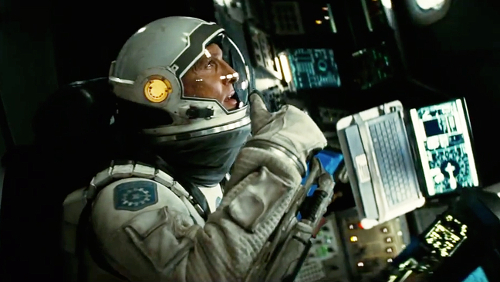
Christopher Nolan is undeniably an extremely talented filmmaker with a unique voice. He has a high batting average with his movies; for my money his only real stinker is The Prestige, and that still has plenty of fans. Nolan deserves his clout. Interstellar deserves its moment in the cultural spotlight.
But there is something about Christopher Nolan’s movies that warrants a devotion that is just too extreme. As noted in Matt Singer’s Screen Crush article “What Makes Nolan Fans So Intense?”, daring to speak ill of a Nolan film tends to lure the kind of trollish comments that make internet writers wake up with cold sweats. In the case of The Dark Knight Rises, apparently these rose to the level of death threats (particularly harrowing considering the mass murder at a screening of the film in Colorado).
As a feminist internet writer, I’m familiar with nasty commenters. And maybe that is why I suspect a substantial overlap between the Nolan Defense Squad and the Misandry Accusation Squad I know so well. I might be misperceiving this; I certainly don’t have any hard data to back it up. It’s clear that both groups offer plenty to the general pool of internet trolls, but that doesn’t necessitate they overlap themselves. So I look to the underlying motivations of these groups for further support.

Singer aptly characterizes the intensity of Nolan fans by describing their approach to his films’ critics: “If there’s a potential mistake or flaw, it’s always the viewer’s fault, never the film’s (or, Nolan forbid, the director’s).” This is all too familiar in feminist media criticism. How many times do commenters assert we’re “just looking for something to be upset about”; that is, our criticism should be attributed to our own over-sensitivity rather than the actual presence of flaws in the subject?
The similarities don’t stop there. Singer further posits:
“Looking over Nolan’s filmography you see the same archetypal protagonist reappear again and again: the moody loner who is laser-focused on his mission… perhaps Nolan’s subject matter and his preferred sort of hero resonates particularly strongly with the kind of person who might, oh I dunno, feel so passionately about a movie that they would threaten to strangle someone over it.”
What’s more, this archetypal protagonist is also always a man. Sady Doyle’s review of Interstellar described “Christopher Nolan disease”:
“There is a man. He is a sad man. His sadness makes him no less manly. The wife of this man, she is dead now…The man’s sadness, a great struggle conducted in the deep darkness of his soul, fuels his life’s grandest endeavor: The blowing-up of cool shit. In this noble pursuit of the blowing-up of things, the man’s wounds are healed and his masculinity reaffirmed.”

So not only do we have the celebration of Men with a Higher Purpose, we have the reassurance that unwavering devotion to this Higher Purpose redeems the masculinity of men who succumb to the weakness of emotion in the face of their immense suffering.
I’d add the third prong to Nolan Fan Intensity: that there is intellectual cache in understanding his excruciatingly complex films, and in enjoying their darker themes. If you have to have a profound understanding of theoretical physics to properly appreciate Interstellar, people who like it are smarter than people who don’t. If you can keep track of the layered narratives of Inception and Memento, it proves your cleverness over people who were confused. If the bleak worldview of his Batman trilogy appeals to you more than those other inconsequential “fun” superhero movies, you are a more serious and thoughtful person.

The Misandry Accusation Squad tend to have the same self-satisfied intellectual superiority complex. See: mansplaining, tone policing, unmeetable burdens of proof. And that’s where my glimmers of recognition when it comes to the Nolan Defense Squad become blaring misogynist troll warning klaxons.

Let me be very straightforward: I had no idea what was going on for 90 percent of Interstellar, and I don’t really care to spend any more time trying to figure it out. Maybe love was the fifth dimension or maybe it was gravity; maybe black holes are made of tesseracting bookshelves, maybe transporting hundreds of embryos and (presumably) only one uterus in which to gestate them on the ark to save humanity was a totally great Plan B.
(While I’m at it: Nikola Tesla was not a sorcerer. Your daddy issues cannot be resolved by opening a dream safe. You probably couldn’t be a superhero even if you were a billionaire, or at least your broken back would not heal that quickly.)

So, yeah, I’m not smart enough to understand the science or lack thereof in Interstellar. But if you’re going to reject my hypothesis about Nolan fans because I can’t be bothered with theoretical physics, you’re kind of proving it for me. (Yep, that’s pretty circular logic. So is a lot of the bootstrap paradox nonsense going on in Interstellar.)
Do you think misogynist trolls and the Nolan Defense Squad overlap, or do they independently share a lot of traits? Do you have other explanations for their similarities?
Robin Hitchcock is an American writer living in Cape Town who firmly believes she did get Inception.

I firmly stay in the middle on this subject. I do think that some feminists over analyze movies, to the point where they’re not even analyzing. They ARE looking for something wrong with it(to say this doesn’t happen is ridiculous). But I also don’t think that means they don’t make any good points. It just means those good points are lost in the sea of exaggerated criticism.
Most movie reviews by feminists aren’t like that though. Most I’ve read are very well written.